Blogs » Society » Is the U.S. causing trouble for Confucius?
Blogs » Society » Is the U.S. causing trouble for Confucius? |
- Is the U.S. causing trouble for Confucius?
- 17 young people disappear in Yunnan, police fear a serial killer
- Businesswoman Wu Ying gets 2-year reprieve on death penalty
- Watch: Protester At Xidan Pushed Off Bridge, Then Taken Away In Police Van
- ‘The Bo Scandal: How We Got That Story–Thanks To The Web, You Can Follow The Money Online—Even In China’
- Hong Kong emerges as centre of Asian art
- Weekend Dollop Of Nostalgia: Irish Band In Beijing Circa 1999
- China Service And One Tiny Tiny Hotel Comment. Meaning Versus Nothingness.
- Yet Another Fight Breaks Out Between American And Chinese Basketball Teams
- Book Giveaway!
- Friday Links: Buried alive, serial killer, “two flies,” and now we have lots of documented proof that chengguan are assholes
- Chen Guangcheng Speaks To Anderson Cooper For His First Television Interview
- A Shandong College Canteen Served Its Unsuspecting Students Whale Meat
- This Chicken-Raping Puppy GIF Wins
- Cleaning up healthcare
- Dish of the Day: Fish head @ Xiang Quan Xiangcun
- Top Ten Search List (May 25)
- The Winners of City Weekend's 2012 Readers' Choice Awards
- Bo Guagua graduates from Harvard
- Pictures Of Bo Guagua At His Harvard Commencement Ceremony
| Is the U.S. causing trouble for Confucius? Posted: 25 May 2012 01:11 AM PDT by Allison Carroll Goldman on May 25, 2012  The Southern Metropolis Daily is a Guangdong-based newspaper with a big print circulation in its home province, and a wide national audience online. The front page today features a cartoon of Confucius next to an American flag. The headline: "Is the U.S. causing trouble for Confucius?" According to the article, the U.S. State Department announced on May 17 that many of the Chinese teachers at Confucius Institutes across the country who currently hold J-1 visas, will have to leave by June 30. The Confucian Institutes themselves will also have to apply for accreditation. Confucius Institutes are language and culture-promotion organizations sponsored by the Chinese government. They have been set up on university campuses across the globe in an effort to build national 'soft power.' There are currently 81 of them operating in joint-partnerships with American universities. The J-1 visa is a non-immigration visa for individuals who wish to undertake work-and-study-based cultural exchange programs to the US. The Southern Metropolis Daily reports that the US has refused to renew J-1 visas for teachers at the Confucius Institutes, and will require them to return to China by June 30 to apply for a new visa. The Confucius Institutes themselves will have to apply for accreditation, despite the facts that they do not grant degrees; and other cultural organizations, like the Goethe Institute for Germany and France's Alliance Française, operate without official certification. Meanwhile, the China Daily reports that this is not quite the case: the US State Department has clarified its directives in response to strong reactions by both U.S. host universities, and the Confucius Institute headquarters in Beijing. They now say that not all Confucius Institute teachers will have to leave the US by June 30. It is only faculty who are teaching students at the elementary- or secondary-school level that are violating J-1 exchange program visa rules, and will have to return to China to reapply for an appropriate visa program. This would force about 51 teachers to return home to China. Notably, this controversy comes at the same time as Beijing's new campaign to rid the capital of so-called "three illegal" ( 三非) foreigners: foreigners who either entered the city illegally or are living or working in the city without the proper visas. As the Wall Street Journal points out, although the U.S. State Department denies the directive was intended to target Confucius Institutes specifically and says that this was "simply a regulatory matter," it's hard to ignore the coincidence of timing. Also on the front page: the verdict has been reached in the case of a boy who sexually assaulted and then killed a female classmate in the bathroom of the Dongguan Polytechnic Institute, where they were both students. He was found guilty, and sentenced to death with a two-year reprieve. The girl's parents, who were awarded more than RMB 50 million in compensation, are not satisfied. They are appealing to have him sentenced to death immediately. Links and Sources: |
| 17 young people disappear in Yunnan, police fear a serial killer Posted: 24 May 2012 02:19 AM PDT by Allison Carroll Goldman on May 24, 2012  The Chonqing Economic Times is a newspaper under the Chongqing Daily Press Group. It has a circulation of 630,000 copies per day and has the largest voluntarily-paid circulation in the province. Today the front page announces a new round of economic stimulus to promote stable growth in China. According to the article, the State Council has decided to launch 11 new stimulus initiatives to deal with the recent economic slowdown. Meanwhile, the featured picture shows three parents. One is holding a home-made sign about their missing children. The headline reads: "In Jinning county, Yunan Province, 17 people have disappeared – there may be a serial killer." The article reports that both the local Jinning Public Security Bureau Chief, and the deputy magistrate have been fired over the missing persons case. The first person to go missing seems to have been Han Yiu, a 19-year-old who went missing near the north gate of Jinning County on April 25. Thereafter, 8 other young people went missing in the same area, in quick succession: one of them was 12; the others were all just over the age of 16. This caused public panic, and resulted in a joint task force by the Kunming Public Security Bureau and the Jinning Country Public Security Bureau. Aside from the relative youth of the victims, they do not seem to have much in common. Moreover, their family members all swear did not run away, they have no major property that could tempt anyone, and none of them had any major inter-personal conflicts, all of which are usually common features of missing-persons cases. The article features a jumbled timeline of how the suspected-serial-killer case unfolded. Han Yiu went missing in April, was found dead sometime in early May, and confirmed to have been killed on May 9 at 9:00 pm. At that point, the police also arrested a suspect: a 56-year-old man called Zhang Yongming, who was found in possession of Han Yiu's cell phone, bank cards and related documents. They also found evidence of the killing. While it is unclear from the body of the text where this number comes from, the title suggests the number of missing-persons has now risen from the 9 mentioned in the article, to 17. Links and Sources |
| Businesswoman Wu Ying gets 2-year reprieve on death penalty Posted: 22 May 2012 01:58 AM PDT by Allison Carroll Goldman on May 22, 2012  The China Youth Daily is a commercial daily run by the Communist Youth League. The front page today features a story on Wu Ying, the 31-year-old, Zhejiang-based entrepreneur who was sentenced to death in 2009 for illegal fundraising, and cheating investors out of 380 million yuan ($60 million). The initial sentence sparked public outcry in China: people called for clemency and questioned the wisdom of China's fund-raising system. Wu appealed her case to China's Supreme Court in April this year, and had it sent back to Zhejiang courts for re-sentencing. Today the national headline reads, "Wu Ying fundraising-fraud retrial ordered a reprieve." The article reports that the Zhejiang Higher People's Court has made a final judgment on Wu's case: She will be sentenced to death with a 2 year reprieve. All of her personal property will be confiscated, and she will be stripped of all political rights for life. The 2-year reprieve probably means that her death sentence will ultimately be commuted to a life-sentence, experts say. The China Youth Daily reports that Wu's illegal fundraising defrauded investors by making unrealistic promises of high-interest returns. In addition to causing major losses for the victims, this behavior severely disrupted the order of financial management in China. The facts are clear, and evidence reliable and sufficient. The 2-year reprieve was issued because Wu confessed to her crimes and voluntarily disclosed that she offered bribes to several government workers. The case has caused many people to question China's current financing system, which makes it difficult for small entrepreneurs to get loans from banks. A recent article in Xinhua points out that its normal for smaller companies in Zhejiang and other provinces across China to seek out financing from private lenders when they are unable to go through a bank. The underground lending market is thriving. Moreover, because it's illegal, there's no oversight. At a press conference in March, Premier Wen Jiabao admitted that Wu's case demonstrates, "we need to guide and permit private capital to enter into the financial arena, standardize it and bring it into the open, encourage its development and strengthen supervision over it." Since Wu's initial sentencing, China has also reformed many of its laws surrounding the death penalty. Last year, China got rid of the death penalty for 13 types of economic and non-violent crimes. Links and Sources: |
| Watch: Protester At Xidan Pushed Off Bridge, Then Taken Away In Police Van Posted: 25 May 2012 06:13 PM PDT This was taken last night by my friend Kris Pickett on the street just north of Chang'an Jie (Avenue of Eternal Peace) near Xidan, about three miles west of Tian'anmen Square (the big building in the background is the Xidan Book Mansion). Kris happened to be walking underneath a pedestrian bridge when he noticed a man with a sign logging a formal complaint. He was unable to get a close look at the sign, though he says he saw the words "Hu Jintao"; in the pictures after the jump (where a Youku video is also embedded for those in China), you can clearly see the words "Hunan province"; everything else is too blurry to decipher (note to protesters: please use bolder fonts). Kris waited for about five minutes as a crowd formed. A passerby shouted stuff up at the man on the bridge, cursed him, then called the cops. Firefighters were brought in to inflate a bouncy tarp and position it underneath the man. The rest you can see in the video — how police pull themselves onto the bridge, slowly advance on the man, then finally push him off. The whole ordeal lasted about fifteen minutes. According to Kris, most of the gathered onlookers were supportive of the protester — whatever he was protesting about. Some even gave lip to the cops. Told to move back, one person (audible in the video) retorts, "Where should we move to?" Others told Kris, "Put this (video) on Weibo!" Another said, "One man brought all these cops out!" One person apparently demanded of the authorities, "Why are you doing this?" The answer seems self-evident: the guy was disturbing the peace… harmony… stability. Perhaps just being generally crazy. Unfortunately in this country, there's not much of a difference between the two. |
| Posted: 25 May 2012 03:02 PM PDT Now that we seem to be at the end of the beginning of the Bo Xilai scandal, consider some the incredible stories unearthed by the foreign press in China. To a large extent, no doubt, these came from foreign journalists' stable of long-standing Chinese sources, as well as, no shortage of Bo enemies happy to talk 'off the record.' What I had missed here, though, was that some of the best reporting came from old-fashioned, shoe leather on the pavement (really, more like keyboards to the Internet), investigative journalism. Correcting my oversight is Dave Miller, alert reader, excellent friend, and on-the-job China Watcher since before the fall of the Qing Dynasty (the stories he can tell about the Empress Dowager and him), who sent me 'The Bo scandal: how we got that story: Thanks to the Web, you can follow the money online—even in China,' by Sheila S. Coronel, in the Columbia Journalism Review. Ms. Coronel lifts the hood on the process of Bo-Gu research itself. Here, she sets the context: In the past, it would have been nearly impossible to document allegations that Bo Xilai and his wife, Gu Kailai, a high-powered lawyer, used their political connections to enrich themselves. But this is the new era of investigative reporting. Governments and companies are publishing increasing amounts of information online—yes, even in China. And the ability to find and mine that information gives journalists a competitive edge over their rivals. From there, she outlines how journalists followed the money, just as Deep Throat counseled Woodward and Bernstein, and put together stories about the Bo-Gu family that rival Watergate. You will enjoy, as I did, the intricate and fascinating account how Hong Kong's Next magazine tracked down the Bo-Gu relatives and how those relatives aided and benefited from their connections. Here's an example of that practice and of creative investigation: Next Magazine was also intrigued by a Xinhua story that said Bo's brother, Bo Xiyong, is a director and vice chairman of the Hong Kong-listed China Everbright International. The state-owned company, which controls one of China's major banks and a range of other businesses, is a "red-chip"—a term given to the stocks of mainland firms incorporated outside the country and listed in Hong Kong. But when the magazine checked the China Everbright website, it found no one named Bo Xiyong there. So Next reporters then searched the Web for anything they could find on all the Everbright directors. The eureka moment came when they found the photograph of a man named Li Xueming on the website of the National Committee of the Chinese People's Political Consultative Congress. It matched the photo they had seen of Bo Xiyong—a picture taken at the funeral of his father, Bo Yibo. The senior Bo was one of the so-called Eight Immortals, describedby The New York Times as "elderly but immensely influential party veterans who hovered above the country's appointed leadership in the 1980s and '90s." As Everbright director, Bo Xiyong (or Li Xueming) receives a $1.7 million annual salary and holds stock options worth nearly $25 million, according to a profile published by Bloomberg Businessweek. Little Next's work inspired the New York Times, Bloomsberg, and other giants to dig deep. And, Ms. Coronel discusses their investigations, also interesting but covered in less detail. The article ends with a do-it-yourself investigation journalism kit: Editor's Note: The article above contains several links useful for international, in-depth journalism, and here are some more: … Now, where to begin? What about this Xi Jinping character? And, what's his wife's name again? |
| Hong Kong emerges as centre of Asian art Posted: 25 May 2012 12:08 PM PDT |
| Weekend Dollop Of Nostalgia: Irish Band In Beijing Circa 1999 Posted: 25 May 2012 11:30 AM PDT Posted on Monday by YouTube user texasdaveodell – who longtime Beijingers will remember as Dave, a staple in the local punk scene — the musicians in the video could well be Beijing's first Irish band, active from 1999 to 2001. (Or not — someone out there correct this bit of info in the video title if you can.) Like a true nostalgic, Dave has asked the members of the outfit to contact him at dave@texasdavid.com. You know what they say about growing old and wistful: the older you get, the more you wish you would've married that curly-haired flutist in that Irish band. Youku video for those in China after the jump. |
| China Service And One Tiny Tiny Hotel Comment. Meaning Versus Nothingness. Posted: 25 May 2012 10:42 AM PDT This blog has been around for more than six years and during that time we have picked up a number of regular e-mailers. Some of these are people who, for whatever reason, refuse to comment on the blog, even anonymously, preferring to leave their "comments" via email. Then there are the people who have a regular agenda/theme. There is the person who for years has sent me emails "proving" China's economy is a bubble that will inevitably pop. There is the person who thinks China is amoral and that will eventually cause it to rot from inside. This person is constantly sending me emails showing how "bad" the Chinese people are. On the rare occasions when I respond, I usually do so by pointing out something similar that just happened in the United States. Or I sometimes just say that one can certainly expect a lot of bad apples in a batch of 1.5 billion of them. I have always thought this person keeps emailing in the hopes that we will eventually take one of his emails and do a post on it. Well that someday is now. And here's the problem. I am not sure whether I am seeing something where there is nothing simply because the constant barrage of emails has worn down my critical thinking skills, or if for once, the e-mailer is right. China is different than anywhere else. Note though how I said "different" not anything having to do with morality. So here's the email:
You have to admit that no hotel manager anywhere else in the world would go online and treat a guest like this. The manager starts out calling the guest a liar because there is no record of any complaint and then he blames the guest for not requesting the right room. Despite this, he still thinks the guest will return but just ask for a room not near the elevator the next time. This is typical of China and you know it. Anywhere but China, the manager would apologize and say that he is looking into the problem and that it will be fixed. This lack of introspection and blaming the foreigner for everything is going to doom China to mediocrity. Okay, so I hate to take one tiny incident and one hotel manager (at an American hotel no less) and say that it is going to doom a country of 1.5 billion people, but I really don't have a very good response beyond that. Do you? My problem is that I cannot imagine a manager of a fairly high end hotel (American no less) saying something like this to a guest, much less online. And yet the fact that a manager of a hotel in China said this does not surprise me at all, which means I must think this sort of thing is "typical of China." But at the same time, this really is just one person out of 1.5 billion and so I really do hate to use this tiny incident to extrapolate. People, help me out here. Should we view this one bad hotel manager as emblematic of China or is this just one tiny meaningless incident? The phone lines are open…
|
| Yet Another Fight Breaks Out Between American And Chinese Basketball Teams Posted: 25 May 2012 10:59 AM PDT In the wake of the "British rapist" and Russian cellist, this won't help Chinese-foreigner relations: a basketball team called the New Orleans Hurricanes — possibly this one from Texas – was in Jiaxing, Zhejiang province yesterday for an exhibition against the Zhejiang Guangxia Lions that ended in the worst way possible. In the above video (and below, on Youku, for those in China), players from the two sides are knee-deep in a full-on brawl while water bottles rain down from the crowd. One player, kind of hilariously, slips and falls on his backside. A much less funny thing happens at the end when an unidentified American hurls a chair into the stands. Per the norm, Deadspin is first to this story:
Information is beginning to trickle in on social media and message boards. After the jump, the Youku video, plus pictures. UPDATE, 2:08 am: As told by Weibo user Rourou Shushu:
From Shi Shiwu: |
| Posted: 25 May 2012 10:53 AM PDT To celebrate the imminent release of my book, Designated Drivers: How China Plans to Dominate the Global Auto Industry, I will be giving away three signed copies next week. Designated Drivers is about much more than the auto industry. It uses China's auto industry to tell a story about how China's central government manages its economy in its drive to create global industrial champions. It's an important story for anyone considering doing business in or with China as well as for policymakers who want to better understand business-government relations in what is still the world's most consistently fast-growing economy. If you would like a chance to win a free copy of my book, all you need to do is "like" the Designated Drivers Facebook page and share it on your page. The Facebook page is here: https://www.facebook.com/DesignatedDriversChina On Tuesday, May 29 at 08:00, pacific time, I will select three "likers" at random* and send each of them an autographed copy of Designated Drivers. And if the number of "likes" surpasses 500, I'll throw in another two copies for a total of five possibilities to win! This morning a friend emailed me a picture taken at a bookstore in Hong Kong showing a few copies already on the shelves there, so it should only be another week or so before copies reach North America. _______________ * To ensure randomness, I will copy all names into an Excel spreadsheet, number them consecutively, and use Excel's random function to select three (or maybe five!) numbers from the list. |
| Posted: 25 May 2012 09:55 AM PDT
It's been somewhat of a stressful day for the blog, considering our server went down for several hours. Apologies for it all, and the lateness of these links. There are few worse ways I can think of to die than being buried alive. "Chinese police have arrested a young couple who buried an old woman alive believing she was dead after their car hit the 68-year-old, newspapers said on Thursday, in a case which has sparked outrage over declining public morality. // The couple had been at an all-night karaoke session when they hit the woman while driving in the early hours of the morning in the wealthy eastern province of Zhejiang last month, the official China Daily said." [Reuters] As far as I can tell, the only purpose chengguan (street officers) have is to bully street vendors and generally act like thugs and knaves. They exist because…? "The 76-page report, 'Beat Him, Take Everything Away,' documents abuses by the chengguan Urban Management Law Enforcement (城管执法) forces, including assaults on suspected administrative law violators, some of which lead to serious injury or death, illegal detention, and unlawful forceful confiscation of property." [Human Rights Watch] Seventeen people missing in Yunnan, serial killer feared. Seventeen people? "Aside from the relative youth of the victims, they do not seem to have much in common. Moreover, their family members all say that they did not run away, did not own any major property that could tempt anyone, nor did any of them have any major inter-personal conflicts, all of which are common features of missing-persons cases." [Danwei] Confucius Institutes under risk? "'Haha, the U.S. is scared of our education,' the user wrote. 'It's because we're good at brainwashing. The U.S. is afraid we'll turn their next generation into our current generation.'" [WSJ] Porn is not a trivial matter. "Local police were still searching last night for a male suspect, who fled an Internet café after stabbing an employee who had tried to stop the man from downloading software to play porn. // …'It didn't occur to me that he would stab me over such a trivial matter,' Shi told local media Wednesday." [Global Times] Headline almost as confusing as the regulation itself. "Authorities in the Chinese capital have set new standards for public toilets, including a stipulation that they should contain no more than two flies." [BBC] Anyone seen 62 missing issues of Time? "Like other foreign news publications available in limited quantities in China, TIME is subject to the occasional banishment from the newsstand. Our issue the previous week on disgraced Communist Party official Bo Xilai had been barred from distribution at hotels and other select purveyors, although subscribers living in China received their copies without a hitch. An essay on the plight of legal activist Chen Guangcheng that appeared the week after the People's Republic of Scandal cover was ripped out of each issue before the magazine was allowed in." [Time] Jews wanted. "It's nice to know there's still a part-time job available in Beijing for a tall, white, male, Jewish, Harvard-educated fluent Mandarin speaker." [Foreign Policy] Props to the Beijinger for running more original content recently: "The Nirvana Man dwells in Wudaokou, where he wanders along the sidewalk outside Pyro's Pizza and Propaganda, conversing with random young foreigners. He's a skinny, oily-looking guy, with a greasy quaff that stands about four inches high and teeth that look like little shards of porcelain." [the Beijinger] K-Town reality TV show interlude, via 8Asians (YouTube video there): Finally… Hutong brewing with Hardy Simes. [World of Chinese] Another assault against Chinese students in Sydney. [Radio Australia] Tom Doctoroff: "Why Chinese Shoppers Love U.S. Brands." [The Atlantic] Chinese famine documentary. [BBC] Gan Lulu at the Shanghai Kitchen & Bath Expo, via Shanghaiist: |
| Chen Guangcheng Speaks To Anderson Cooper For His First Television Interview Posted: 25 May 2012 09:35 AM PDT CGC: "I want to correct one thing here. When we talk about my situation in the future, let's not use the word 'house arrest,' but instead let's use the term 'illegal detention.' …My suffering was beyond imagination." |
| A Shandong College Canteen Served Its Unsuspecting Students Whale Meat Posted: 25 May 2012 08:00 AM PDT Earlier this week, students at the Shandong Institute of Business and Technology went on Weibo to complain about their food tasting "sour, tart," according to an article on the website 21food.cn. And why would food taste like that? The picture above is not some random dead whale, but the whale served up at the Shandong Institute of Business and Technology canteen. "We were very surprised to see a whale in the school cafeteria," a student told China Broadcast Network. To the best of anyone's knowledge, the whale was served simply because it was available — dead, that is. According to comments on Weibo, some are uncertain whether it was killed by fishermen or died naturally (and washed ashore?), though wounds around the whale's mouth indicate it had been poached. "Whales are nationally protected animals," the article on 21food.cn states. "Is it so delicious as to be worth pursuing?" Sour, tart. The answer is no. |
| This Chicken-Raping Puppy GIF Wins Posted: 25 May 2012 06:13 AM PDT This video, originally 10 minutes, first appeared about four years (full version on Youku after the jump), and possibly because of its length, it lived down to its viral potential. There was too much pictorial white noise, so that a punchy title such as "Dog Lures Chicken Into Love Den, Proceeds To Hump (Rape?) It" didn't exactly convey all that was happening. The clip was also shown on several newscasts in China, resulting in it getting copied and disseminated through multiple channels across the Internets, effectively watering it down. Alas, those problems are now gone, thanks to the following GIF, uncovered earlier today by Tea Leaf Nation: In 10 seconds, we get a simple, complete story, with the comedic punch neatly packaged within a jack-in-the-box without any of the previous loose strings poking through. Horny pup humps mother hen, period. No unnecessary buildup. No need for discussing the implications of interspecies sex. No uncomfortable scene of that moment when the chicken suddenly realizes what is happening and begins to resist, followed by an awkward scramble around the yard while the randy quadruped waddles after it with teeth bared and hips gyrating. Because as you see in the video, that part is quite uncomfortable. |
| Posted: 24 May 2012 07:54 AM PDT Hospitals and clinics committed to human health regularly expose patients and workers to hazardous chemicals, writes John Elkington. One entrepreneur is trying to transform the industry. It truly wasn't my fault. I was enjoying the Skoll World Forum in Oxford and Huffington Post publisher Arianne Huffington had to be interviewed early, so I was asked to come back for filming half an hour later. When I did so, one of the studio lights exploded right by my face. A thin stream of chemicals and smoke wound up towards the ceiling and fire alarms sounded out across the ultra-modern Saïd Business School. |
| Dish of the Day: Fish head @ Xiang Quan Xiangcun Posted: 25 May 2012 04:37 AM PDT  Where we grew up in the US, fish head was a dish traditionally served to the ocean's bottom feeders after a fisherman had finished cleaning his/her catch. So upon arriving in Shanghai, we were surprised to find one eye-balling us every time we opened a menu, and yearned to discover what we'd been missing all those years. [ more › ] Where we grew up in the US, fish head was a dish traditionally served to the ocean's bottom feeders after a fisherman had finished cleaning his/her catch. So upon arriving in Shanghai, we were surprised to find one eye-balling us every time we opened a menu, and yearned to discover what we'd been missing all those years. [ more › ]     |
| Posted: 25 May 2012 03:50 AM PDT
1. 甘肃猪蹄厅长 Gānsù zhūtí tīngzhǎng – Liu Weizhong, director of the Gansu Province Department of Health, is known far and wide across the Chinese internet as "Director Pig Trotter" for a startling ignorant public service message earlier this year in which he suggested that terminally ill patients could cure themselves by eating pigs' hooves. Now, he is taking a new wave of online heat, since the posting of a new announcement on the official website of the Gansu Department of Health in which the department celebrates the success of a recent cultish nine-day training course for students of spinal studies at the Gansu provincial hospital. The post congratulates a whole "41 out of 47 students" on their successful "mastery" of a procedure designed to open up access to a system of legendary acupuncture points known as the "ren du liang mai" (任督二脉). The announcement proudly asserts that the students have "proven" the magic of the Jing Luo (经络) Theory of acupuncture and are now all converted "believers." (Also known as the "Channel Theory," Jing Luo is the school of thought which holds that there are channels running through the entire body connecting the internal organs to the limbs and joints. It probably takes longer than "nine days" to get it down.) Mr. Pig Trotter himself was the keynote speaker of the training course, and netizens are railing on him for, among other things, "thinking he is a character in a martial arts story," "putting followers of his 'teachings' in danger," and "obscuring the real, positive features of effective Chinese medicine" behind an enormous cloud of quackery. Here's the story in Chinese. 2. 高速节假日免费 gāosù jiéjiàrì miǎnfèi – China's Ministry of Transport has recently announced that it is drafting a new law under which citizens nationwide will be exempt from paying highway and bridge tolls during major national festivals. Traffic is formidable over the holidays, especially at the start of spring festival (the Chinese New Year) when the vast majority of city dwellers return to their hometowns to be with their families. In response to scores of netizen cries for free passage, it seems like the Ministry of Transport will be granting it. Here's the story in Chinese. 3. 香港收回捐款 Xiānggǎng shōuhuí juānkuǎn – "Hong Kong Takes Back Donations": Yesterday, Chief Secretary for Administration of Hong Kong Stephen Lam Sui-lung announced that after leading a delegation to Sichuan to investigate potential misuses of donations made to the region by Hong Kong following the 2008 earthquake, the HKSAR government will be recalling a 2 million HKD donation it originally presented to the Mianyang city government for the purposes of rebuilding the Mianyang "Red Bud" school (or Mianyang Zijin Minzu High School), which has now been torn down, after only two years of operation, to make way for a commercial development. Reports have come out that the rebuilt school was demolished by developer Dalian Wanda Group, and Mianyang's local government is claiming that the developer went ahead with the project without any official approval. Wanda, meanwhile, is planning to issue an official statement which will likely refute this claim, and its CEO has already essentially said to reporters, "How would we ever be stupid enough to go ahead with a project like this without the permission of the local authorities?" While Wanda and Mianyang point fingers, netizens are criticizing both for blatantly disrespecting Hong Kong's initial magnanimity. Here's the story in Chinese. 4. 汤淼 Tāng Miǎo - Search volume is high for news of an amicable divorce between a beloved athlete couple: former Chinese men's volleyball player Tang Miao and women's volleyball player Zhou Suhong. Both parties have told reporters that while they still care about each other, the nature of their relationship has changed, largely due to an incident in June of 2007 when, in a friendly competition between the Shanghai team and the Russian national team, Tang Miao suffered a serious injury that left him paralyzed. Several news articles are calling this "divorce in the name of love," citing Tang's explanation that he "does not want to hold Zhou back any longer." Though some are taking sides, the overwhelming current of public opinion has been in support for the pair, with microblogger after microblogger wishing both of them well. Here's the story in Chinese. 5. 印度女婴喂狗 Yìndù nǚyīng wèi gǒu – Netizens are up in arms over the recent discovery that doctors in Beed, India have been feeding aborted female fetuses to dogs to hide evidence that they are engaged in the practice of sex-selective abortions; the news has sparked widespread discussion today about the importance of seeing girls and boys as equally worthy of love and life. Here's the story in Chinese. 6. 少壮派富豪榜 shàozhuàngpài fùháobǎng – The Hurun Research Institute yesterday released its 2012 "Richest Chinese Under Forty List." First place goes to the heiress of Guangdong-based development company Country Garden (碧桂园) Yang Huiyan, who is also considered the wealthiest person in mainland China (under 40 or not), but only 8 out of the 33 listed young billionaires are actually "second-generation rich" (富二代), while many of the rest are self-starters and entrepreneurs. Here's the story in Chinese. 7. 跨国电信诈骗 kuàguó diànxìn zhàpiàn – On Wednesday, a total of nearly 500 people suspected of involvement in an enormous transnational telecom scam were arrested by Chinese mainland and Taiwanese law enforcement officers as well as other police forces across Asia. The over-11.5 million USD scam was reportedly targeting people in China. Here's the story in Chinese. 8. 2011年度人权国别报告 2011 niándù rénquán guóbié bàogào – Upon the release yesterday of the U.S. State Department's annual human rights report, whose discussion of China focuses on the government's crack-downs on activists, use of internet censorship, and repression of minority groups, a host of reports in the Chinese news media range from firmly dissatisfied to completely incensed with the results, asserting that the U.S. has altogether overlooked strides China has made on the human rights front, in favor of seizing any opportunity to pick it apart. Here's the story in Chinese. 9. 倪妮 Ní Nī – More people are dating each other. Chinese actor William Feng and Chinese actress Ni Ni, best known for her role as "Yu Mo" in the 2011 Zhang Yimou film "Flowers of War," have now confirmed their romance through proclamations of love via Sina Weibo. Here's the story in Chinese. 10. 东莞理工命案追踪 Dōngguǎn Lǐgōng mìng'àn zhuīzōng – Yesterday at the hearing for the murder trial of Ao Xiang, the college senior from Dongguang, Guangdong province who in November 2011 brutally killed a female classmate after following her into a girls' bathoom and attempting to rape her, the Dongguan intermediate people's court declared Ao guilty of rape and murder but ruled that he pay a 508,799.50 RMB fine in compensation to the family of the deceased as his only punishment. The victim's family refuses to accept the light sentence, and is appealing the case. Here's the story in Chinese. |
| The Winners of City Weekend's 2012 Readers' Choice Awards Posted: 25 May 2012 03:21 AM PDT Date: May 25th 2012 5:05p.m. Contributed by: clairebared Last night, Shanghai's dining and nightlife moguls gathered at Bar Rouge for our annual Readers' Choice Awards. Over 500 people filled the ruby red bar to find out who would take the crowns for Shanghai's best bar and best restaurant. Our hosts for the night, Bar Rouge, won Shanghai's best bar with el Coctel finishing in a close second. The biggest surprise of the night was the winner of Shanghai's best restaurant; French newbies Cuivre took the title for 2012. It was a well deserved win for Chef Michael and restaurant manager Fanny, and they also won the award for best newcomer. Some of the more memorable nightlife awards of the evening included Boxing Cat for best beer, The Camel for best Sports Bar and the Waldorf for best hotel bar. For dining, the crowd blew up when the entrepreneurial ladies from Strictly Cookies and Spread the Bagel claimed a couple of titles over the course of the night. But it wasn't just about the awards; people were there to party and people watch. The crowd went wild when the winners of best service, Hooters (yes, you read that right), performed a saucy dance routine. Heatwolves caused quite the stir when they tried to take over the stage halfway through the awards. Luckily, our nightlife editor, Joho, was able to keep them in line. Bob Li was spotted among the crowd, rubbing shoulders with Shanghai's power players. And super chef Craig Willis went up a notch in our books for bringing his mom to the awards as his plus one. Everyone in the crowd was dressed to the nines and our food writer, Kat Velyo, won the award for the evening's top Fashionista. We also have to give a shout out to Brian ... |
| Bo Guagua graduates from Harvard Posted: 25 May 2012 02:05 AM PDT  Bo Guagua, son of former Chongqing chief Bo Xilai and lawyer Gu Kailai, graduated from Harvard yesterday without his parents by his side. From Reuters: Bo Guagua, son of former Chongqing chief Bo Xilai and lawyer Gu Kailai, graduated from Harvard yesterday without his parents by his side. From Reuters:Bo... wore a black cap and gown with crimson hood when he accepted his diploma at a commencement ceremony in Cambridge, Massachusetts. He flashed a broad smile and joined several hundred other students who came from all corners of the globe to study at the Ivy League school. [ more › ] |
| Pictures Of Bo Guagua At His Harvard Commencement Ceremony Posted: 25 May 2012 01:48 AM PDT
Bo Guagua graduated yesterday from Harvard Kennedy School. Adam Samberg gave a speech, and with that, another lot of wide-eyed, partied-out co-eds officially enter the workforce, ready to displace the infirm and ineffectual. I've said it before, but I'll say it again: the kids these days will spell the end of us all. They're just carrying on an age-old ritual of societal molting, but I suspect this generation will be more merciless than the rest. By the way, did you know Bo Guagua also graduated from Oxford? I dunno, seems important. |


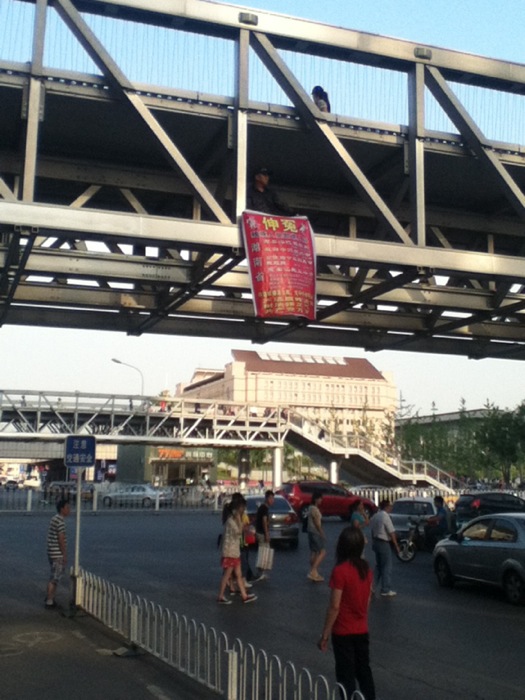

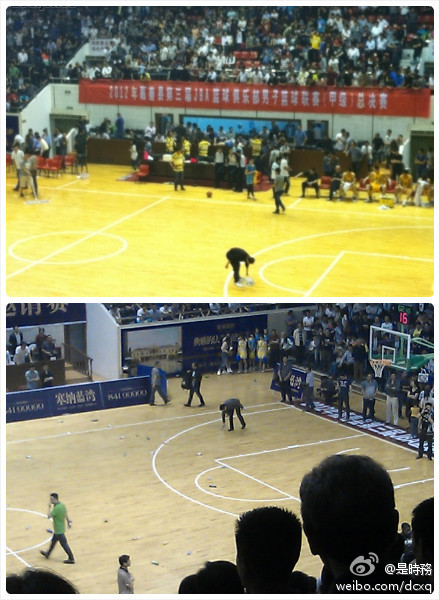



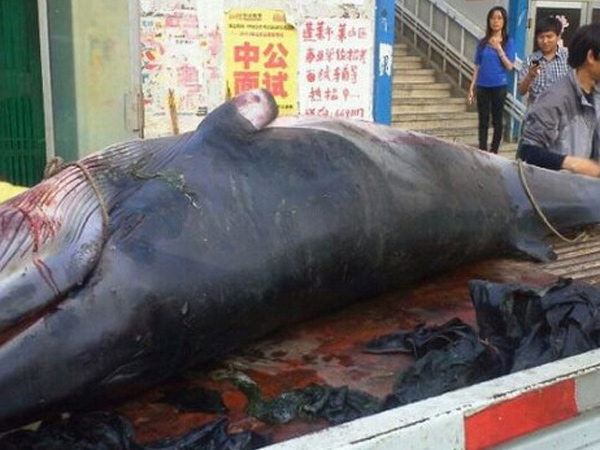









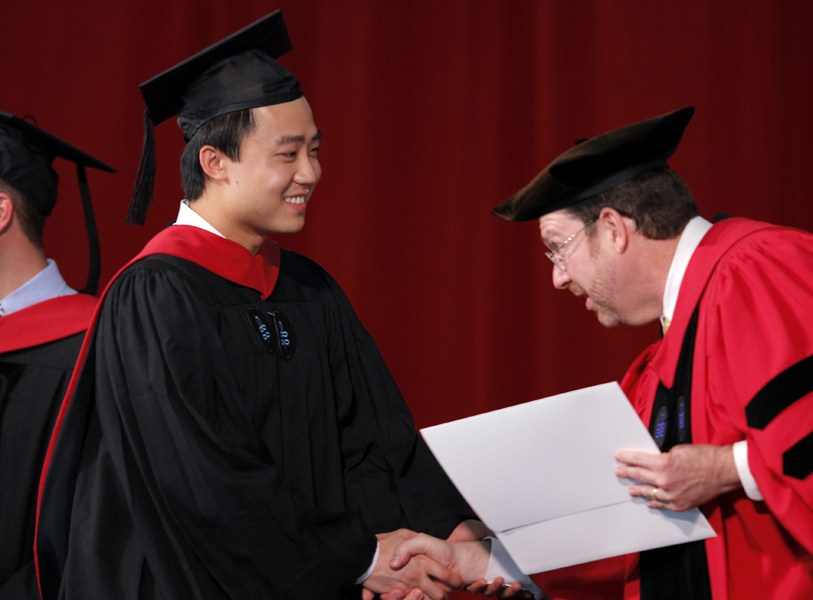
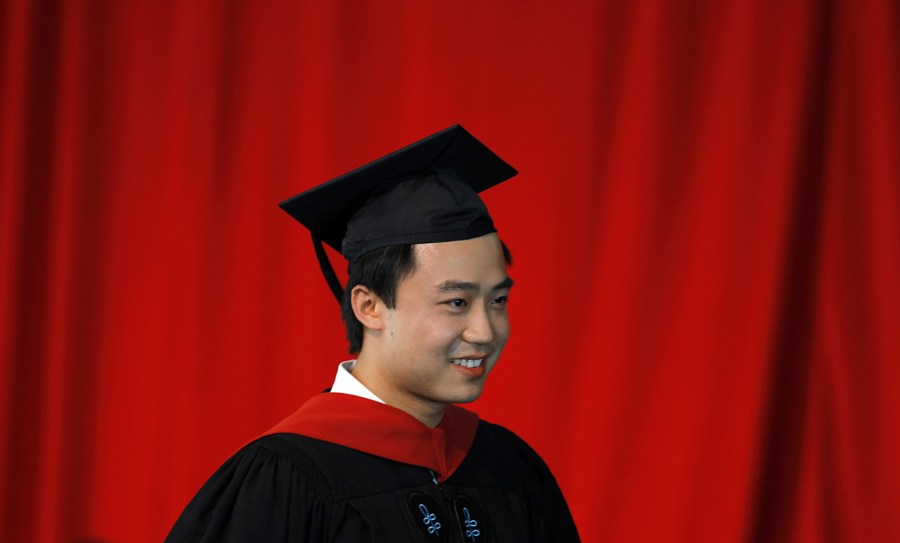
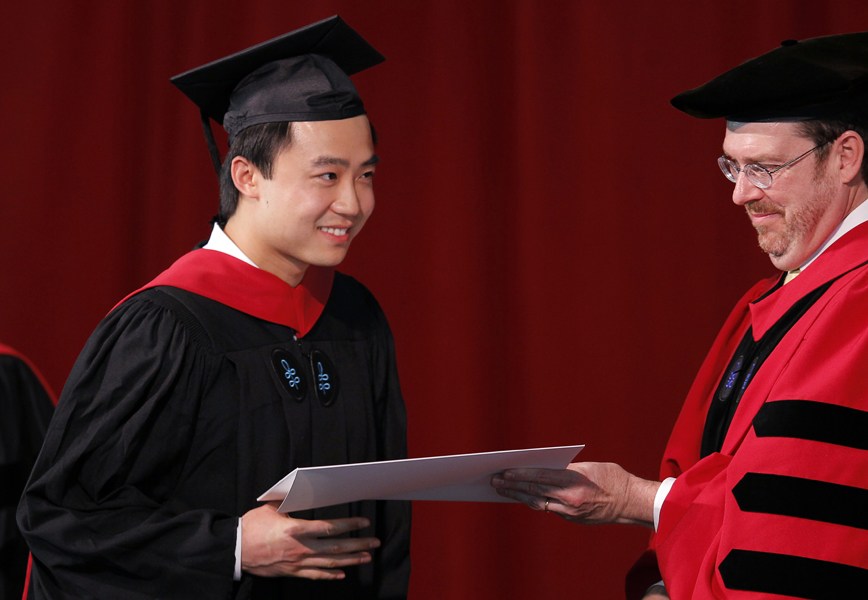
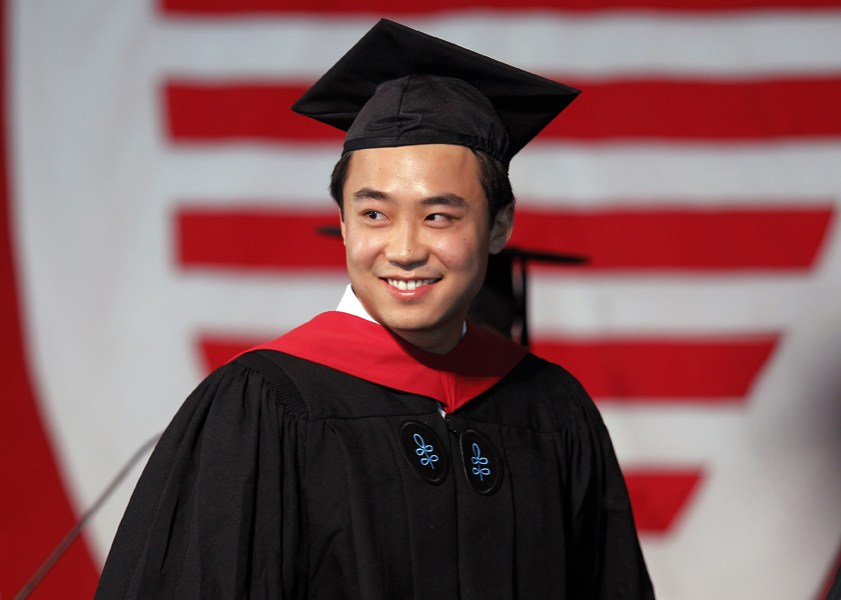
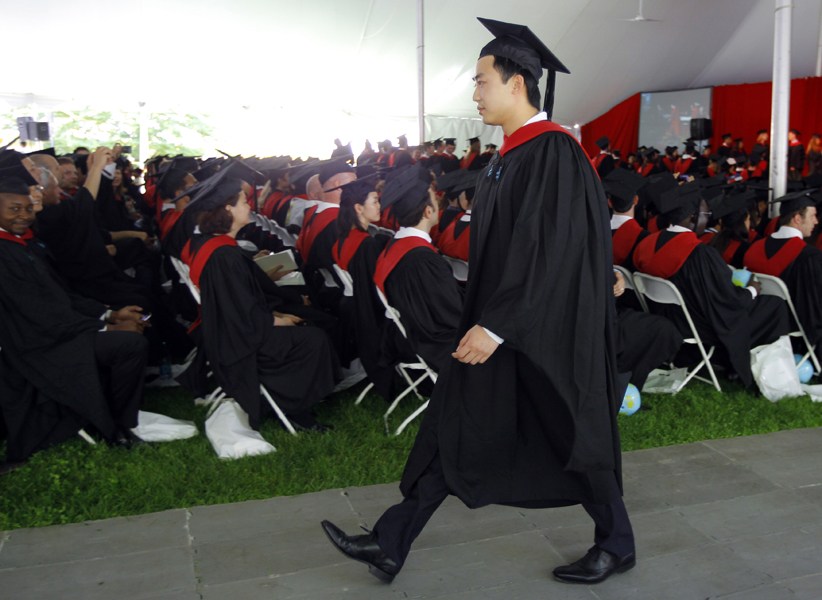
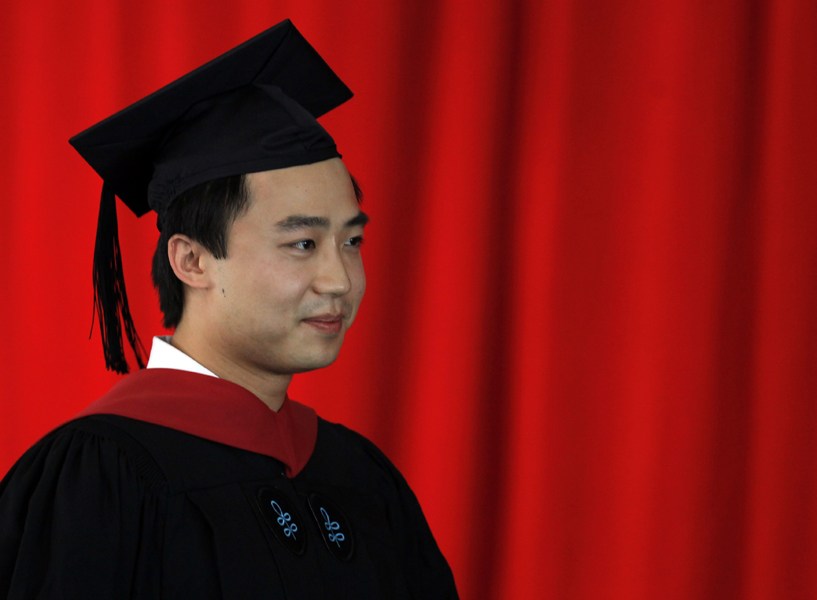
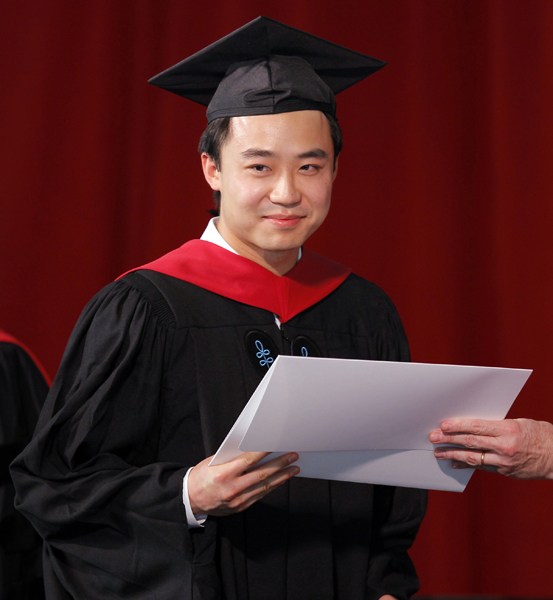
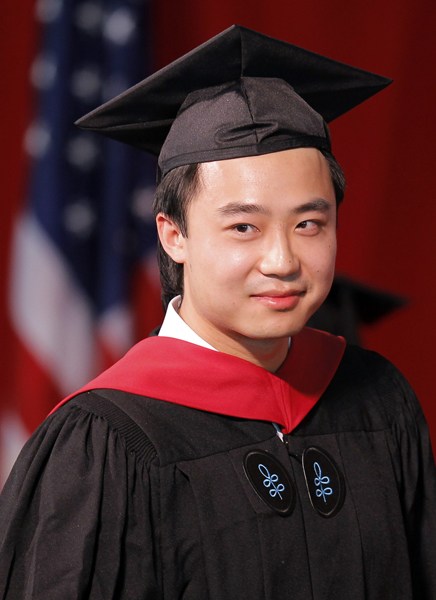
Comments